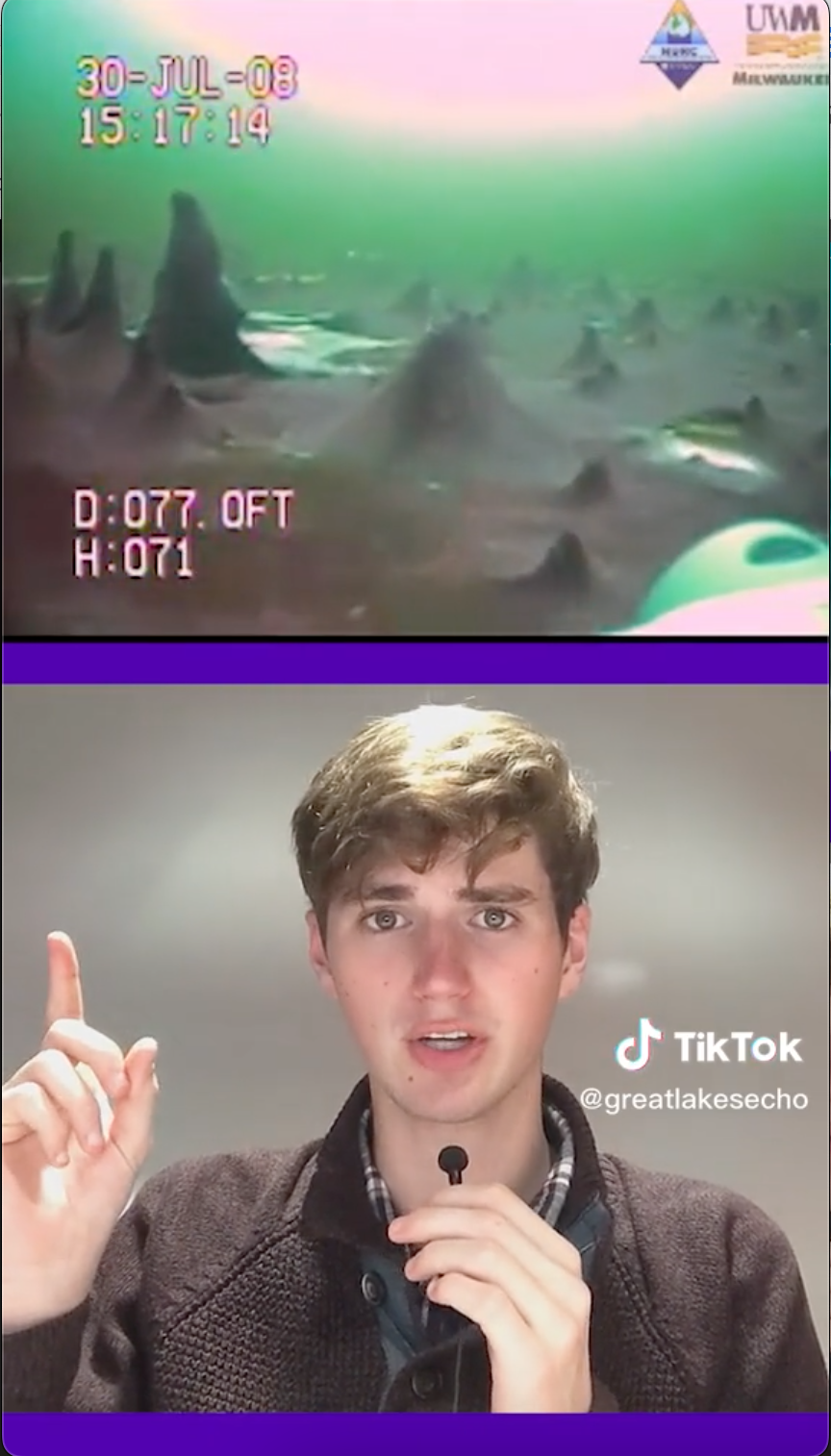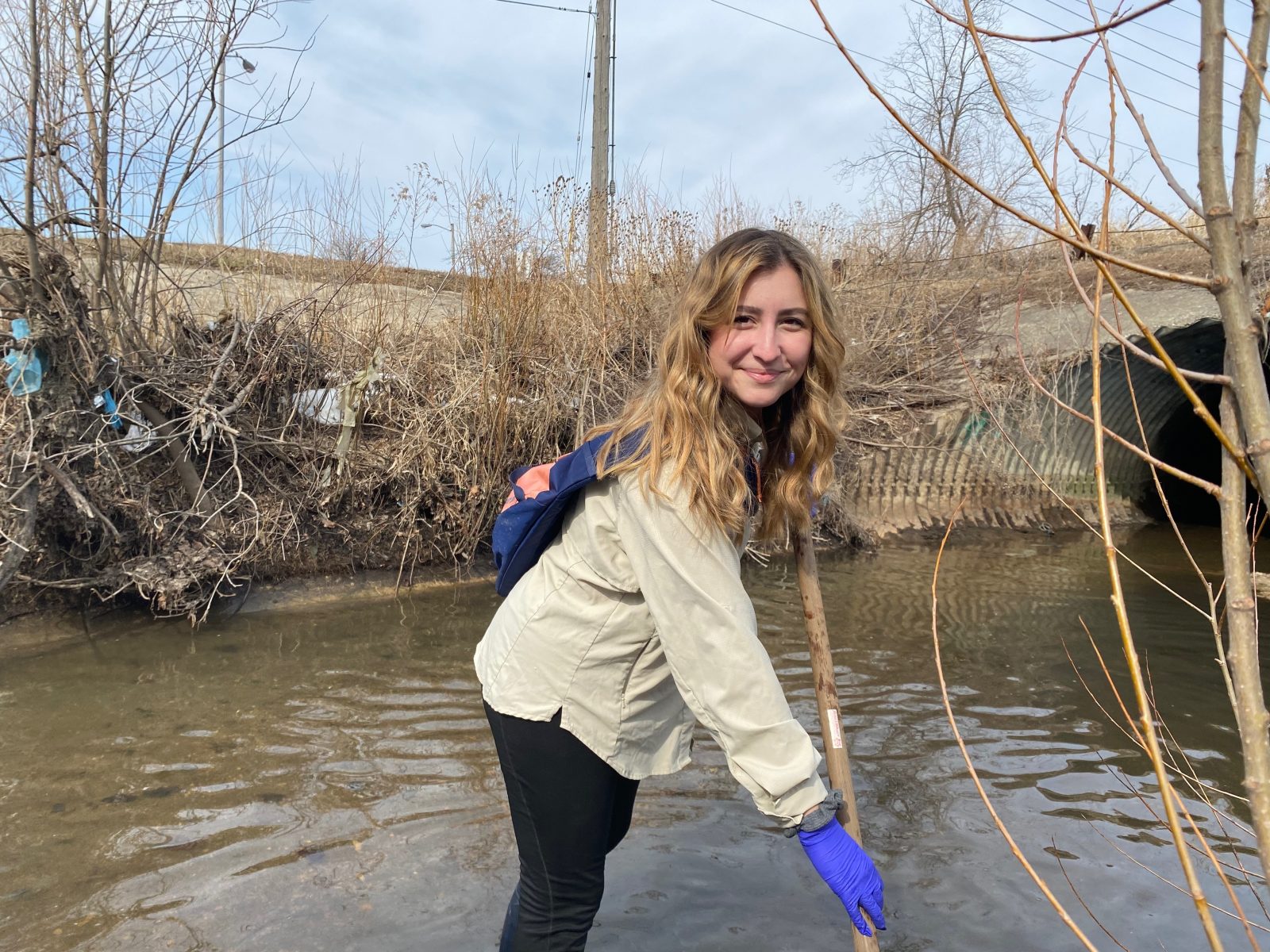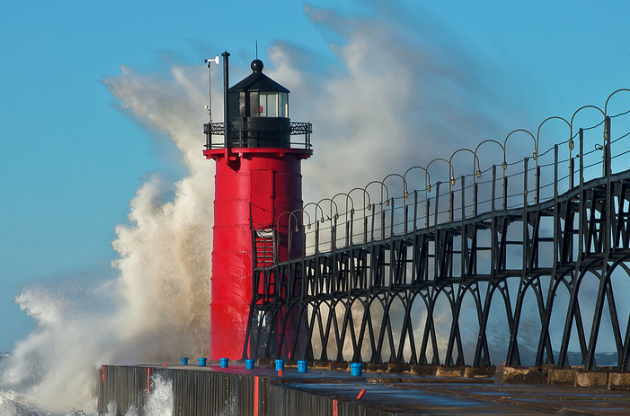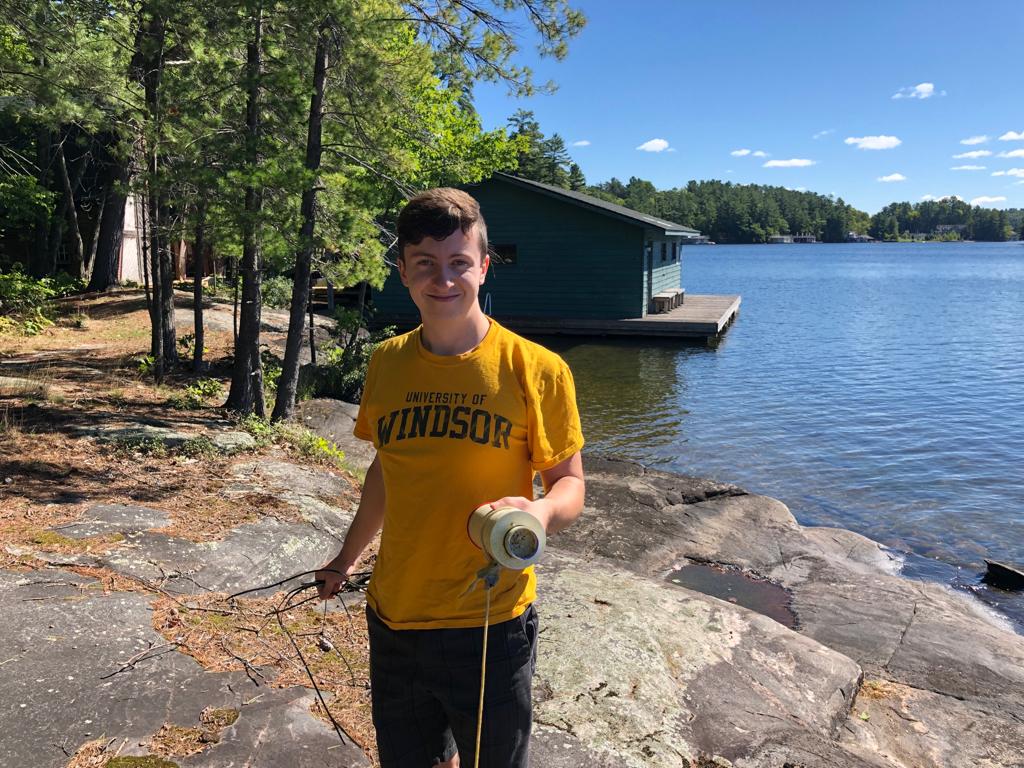Past ECO Program Funding
2023 ECO Program Funding
Project Title: Media with impact: Building a community-driven model for drinking water news coverage
Key Project Personnel: Students: Hira Ahmad, Francesca Levethan, Hannah Rieders, Madeline Rieders, Kausthubh Sumanth; Faculty Advisor: Dr. Mike Shriberg ([email protected])
About: This Master’s Project is a collaboration between the student research team at the University of Michigan School for Environment and Sustainability and Great Lakes Now (GLN), a regional media initiative serving the Great Lakes Basin. The goal of this project is to develop an equity-centered, community-driven media model that connects journalists with affected stakeholders through the production of three core deliverables. First, our project team will partner with the Great Lakes Now team, affiliate news organizations, and frontline communities to identify best practices for community-engaged environmental media and solutions journalism. Second, we will develop an impact assessment toolkit to help media organizations define and achieve their goals, measure their outcomes, and rebuild and refocus newsrooms’ commitment to equitable journalism. Lastly, we will convene a community advisory board of regional NGOs, grassroots leaders, and other core stakeholders to support the development and equitable implementation of these tools, which will highlight local water issues and their solutions. By implementing best practices for equitable community engagement and impactful journalism, our project will equip regional newsrooms to uplift Great Lakes communities’ stories in a positive and solutions-oriented manner. This will help to foster relationships built on trust and collaboration between local communities and news sources. In this way, Great Lakes Now will serve as a case study demonstrating the power of collaborative partnerships between local media and affected communities to increase public awareness and mobilization on water problems nationwide.
Project Title: Empowering Underrepresented Students with GIS
Key Project Personnel: Students: Alyssa Sklar and Robert Davis; Faculty Advisor: Meha Jain
About: A number of user-friendly modules will be created for Earth Camp to teach high-school students the basics of ArcGIS through mapping exercises exploring Great Lakes environmental issues being studied by CIGLR, with a focus on environmental justice issues. Each summer, Earth Camp, the Earth and environmental sciences high-school outreach program at UM, educates ~80 Wolverine Pathways students. 60 students take part in 1-week of summer programming with hands-on activities to expose students to Earth science topics. 20 students take part in a 4-week course taught on campus by Dr. Gregory Dick and Dr. Jenna Munson. Earth Camp has a proven track record of enrolling college-bound under-represented minority students (URM). Over 90% of Earth Camp students are minorities and over 50% are Black. 100% go on to attend college, and 95% major in a STEM field. Earth Camp alumni who attend UM Ann Arbor, Flint, or Dearborn, become part of UM’s Earth Scholars program and are supported by staff through monthly mentoring meetings. Part of this mentorship involves helping Earth Scholars find jobs in research laboratories. The Earth Scholars program has successfully placed 6 former Earth Camp students in research labs as undergraduates. One of these students, Erica Pillar (a Hispanic woman who was in the first Earth Camp cohort and graduated in 2022), is now a laboratory technician at CIGLR under Dr. Casey Godwin. Additionally, a current Earth Scholar, and Black woman, is applying for the CIGLR Summer Fellows Program. Earth Camp is an ideal pipeline to attract diverse students to CIGLR and NOAA as there is strong interest in environmental science among Earth Camp participants. Earth Camp students are lacking GIS skills that will help them be competitive in today’s job market. These ArcGIS modules we are proposing can help the next generation of URM environmental scientists become comfortable with ArcGIS so they are more likely to take a college course with a GIS component, or will gain the knowledge to make basic GIS maps for classes, and eventually can be competitive for jobs requiring GIS knowledge.
2022 ECO Program Funding
Project Title: Environmental Reporting for the Great Lakes Region
Key Project Personnel: David Poulson (Michigan State University Knight Center for Environmental Journalism) and students
About: A countless number of intriguing environmental, Great Lakes stories often remain trapped in labs, fieldwork, journals and in the minds of science resarchers. If shared, these stories can ignite significant interest and support throughout local and regional communities around the Great Lakes and beyond.
Michigan State University’s (MSU) Great Lakes Echo is an environmental news service produced by the Knight Center for Environmental Journalism that translates Great Lakes research and information into journalism for the public. With funding from a CIGLR Engagement, Career Training and Outreach (ECO) Award, MSU’s Great Lakes Echo trained and developed 11 undergraduate journalism students that produced, distributed and broadly shared 52 news stories that referenced and highlighted the work of CIGLR’s research institute and regional Consortium.
 “Funding from CIGLR’s ECO Award was vital for helping our team share and write about research created by Great Lakes scientists around the region,” said David Poulson, Senior Associate Director of MSU’s Knight Center for Environmental Journalism. “News organizations, nonprofit and government agencies and others use stories directly from Great Lakes Echo, including MSU’s Capital News Service wire that distributes relevant Great Lakes news to 40+ newspapers around the state of Michigan ranging from large, high impact publications to smaller, weekly periodicals. Our team also developed new text and radio partners, extending our regional reach, and created a TikTok channel to showcase Great Lakes research to a wider, more diverse audience. CIGLR’s support helped our team inform the public around the Great Lakes region about environmental challenges, solutions and important science research stories.”
“Funding from CIGLR’s ECO Award was vital for helping our team share and write about research created by Great Lakes scientists around the region,” said David Poulson, Senior Associate Director of MSU’s Knight Center for Environmental Journalism. “News organizations, nonprofit and government agencies and others use stories directly from Great Lakes Echo, including MSU’s Capital News Service wire that distributes relevant Great Lakes news to 40+ newspapers around the state of Michigan ranging from large, high impact publications to smaller, weekly periodicals. Our team also developed new text and radio partners, extending our regional reach, and created a TikTok channel to showcase Great Lakes research to a wider, more diverse audience. CIGLR’s support helped our team inform the public around the Great Lakes region about environmental challenges, solutions and important science research stories.”
Video Media: Michigan State University student Daniel Schoenherr created this TikTok about Lake Huron cyanobacteria, one of many research stories produced by Great Lakes Echo under a grant from the Cooperative Institute of Great Lakes Research.
News Media:
-
- Michigan study linking environment to cancer provides ammo for health policy – September 22, 2022
- Belle Isle study lights way for savings – September 27, 2022
- Study: Why are Lake Superior’s quiet winters so important? – October 4, 2022
- UWindsor undergrad cuts research costs with DIY erosion sensors – October 6, 2022
- Study nudges college students to eat more fruits, veggies – October 14, 2022
- University researchers rescue mussels from dams – October 19, 2022
- Minnow researcher uses You Tube, children’s literature to connect people with at-risk species – October 21, 2022
- An ancient building material could be the wave of the future – October 28, 2022
- Plastic pollution robs fish of nutrients – October 31, 2022
- Grand Valley student chalks up a research success – November 1, 2022
- Study finds lake cleanups help house values recover – November 11, 2022
- The future of sustainable aviation could be electric – November 15, 2022
- What lies on the lakebed of the Great Lakes? NOAA ship conducts survey mission – November 16, 2023
- Study shows value of culturally appropriate environmental health resources – November 17, 2022
- Cornell researchers farm pixels – November 22, 2022
- Ancient invention may safely move fish across barriers while blocking invaders, study finds – November 23, 2022

Ben Chittle (UWindsor undergrad ) holding a homemade water wave sensors. See #4 under “News Media” for more on this project.
- Researchers in Minnesota acquire first genome for doli algal bloom – November 28, 2022
- Exploring Lake Huron sinkholes may help find life on other planets – November 29, 2022
- Smartening up a beach could save lives – December 6, 2022
- City street trees mitigate climate change better than expected – December 12, 2022
- Lake Erie algae mucks up fishing trips – December 15, 2022
- Ice makes oil spills harder to detect, easier to contain – December 22, 2022
- Joyous Noel: Great Lakes’ great waves give surfers a gift – December 23, 2022
- Beach cleaning robots are coming to Lake Erie – December 26, 2022
- Algae depresses Lake Erie home values – December 27, 2022
- Climate change prompts rise in fungal toxin – December 29, 2022
- Study details impact of COVID-19 pandemic on energy bills – January 3, 2023
- Melanoma cases higher in rural areas, study finds – January 10, 2023
- Study finds Great Lakes influence bird migration patterns – January 11, 2023
- New Northwestern Michigan College two-year degree readies students for water technology jobs – January 13, 2023
- Pipedream: Researchers hope to convert exhaust into fuel – January 16, 2023
- A cost-effective solution to beach erosion – January 23, 2023
- Effectiveness of cormorant hunting questioned – January 30, 2023
- Climate change is killing our trees, study finds – January 31, 2023
- Gardening with a whole community could reduce violent crimes in neighborhoods, study says – February 3, 2023
- Oilseeds could help farmers and soil alike – February 7, 2023
- Woof, there it is: A spotted lanternfly! – February 8, 2023
- MiWaterNet monitors quality of northern Michigan streams – February 27, 2023
- Michigan’s list of birds at risk updated for first time since 2009 – April 18, 2023
- Could young students be Michigan’s next environmental stewards? – May 4, 2023
2021 ECO Program Funding

University of Wisconsin Milwaukee graduate student Lexi Passante sampling Wisconsin’s Kinnickinnic River. Photo Credit: Lexi Passante.
Project Title: Communicating the Impact of Road Salt Pollution in the Great Lakes
Key Project Personnel: Lexi Passante (University of Wisconsin Milwaukee) and Sandra McLellan (University of Wisconsin Milwaukee)
In The News:
-
- Data Nuggets: Salty sediments? What bacteria have to say about chloride pollution
- Passante, E.K.; L.E.Dechant; C.J.Paradis; S.L.McLellan. 2022. Halophilic bacteria in a Lake Michigan drainage basin as potential biological indicators of chloride-impacted freshwaters. Science of The Total Environment. 846 (157458). (DOI:10.1016/j.scitotenv.2022.157458). [Altmetric Score]
About: In snowy climates, road salts are applied to keep roads safe but end up in waterways through snowmelt events. Chloride (a chemical compound found in road salts) permanently pollutes and raises the salinity of freshwater and can be harmful to aquatic organisms when exposed. However, not much is fully understood of the long-term impacts of chloride. Lexi Passante, a graduate student in Sandra McLellan’s, PhD, laboratory at the University of Wisconsin Milwaukee (UWM) School of Freshwater Sciences took a microbiological approach to investigate these impacts. With support from a CIGLR ECO Award, Passante sampled sediment at riverine sites located in a Lake Michigan drainage basin and discovered widespread halophile populations. Halophiles (salt-loving bacteria) generally require the presence of salt to survive, and can be found in places like our oceans. “Our findings were very surprising!” said Passante. “We thought it would be difficult to find halophiles sustained in freshwater—so, we definitely wanted to share our results with the hope of educating others about chloride pollution.” Passante teamed up with Wisconsin Salt Wise, Oconomowoc High School, Waukesha County, and the UWM Film Department to create educational materials through Data Nuggets and a video series that documented Passante’s research. “The data we collected was incorporated into the Data Nuggets educational page for students to learn how to work with environmental datasets,” explained Passante. The videos are currently promoted by the Wisconsin Salt Wise social media team to advance chloride awareness.
2019 ECO Program Funding
 Project Title: State of the Strait: Reporting on Indicators of Ecosystem Health
Project Title: State of the Strait: Reporting on Indicators of Ecosystem Health
Key Project Personnel: John Hartig (GLIER) and Jan Ciborowski (University of Windsor)
In The News:
- Detroit River-Western Lake Erie Basin Indicator Project
- 2006 State of the Strait Report on Indicators
- CHECKUP 2020 Assessing Ecosystem Health of the Detroit River and Western Lake Erie
About: An important Canada-U.S. collaboration on the health of the Detroit River and western Lake Erie is the biennial State of the Strait (SOS) conference. This Conference brings together Canadian and U.S. managers, scientists, environmental organizations, industrial representatives, business and community leaders, students, and concerned citizens to address key issues pertaining to the health of this ecosystem. SOS conferences are important mechanisms for synthesizing science, strengthening the science-policy linkage, and catalyzing actions to improve ecosystem health. They typically attract 200-300 people.
The 2006 SOS Conference focused on status and trends of key indicators. It has now been 13 years since this indicator reporting effort was initiated and a comprehensive assessment of the ecosystem health performed. This year (2019) marks the next Cooperative Science and Monitoring Initiative focused on Lake Erie and Lake St. Clair and the Detroit River System. This program will engage NOAA and many of CIGLR’s Regional Consortium Partners and represents an opportune time to update and report on the overall ecosystem health. We are working with partners to compile existing data on key environmental, economic, and societal indicators for the region and provide an updated assessment of ecosystem health. We will both update existing indicators and propose new ones. Each indicator report presents background information, long-term trends (30+ years of data), status relative to targets, monitoring and research needs, and important next steps for management.
Updated indicator summary reports have already been completed for 11 indicators and over 30 are under development. These indicators will be the focus of the next SOS Conference scheduled for November 2019 at the University of Windsor. The conference will help provide a timely assessment of ecosystem health, strengthen the science-policy linkages and collaborations, document the Strait’s many restoration efforts and successes, and help catalyze further cleanup and restoration efforts.
Project Title: Communications and Outreach Plan for Dealing with Realtime Great Lakes environmental data
Key Project Personnel: Jill Crossman and Aaron Fisk, Great Lakes Institute for Environmental Research (GLIER), University of Windsor
About: The Great Lakes Institute for Environmental Research (GLIER) at the University of Windsor, a CIGLR partner, will be launching the Realtime Aquatic Ecosystem Observation Network (RAEON) in the summer of 2019, a $15-million Canadian investment in instruments and equipment. REAON will be working closely with NOAA GLERL and CIGLR to deploy four real time sensor arrays in the western basin of Lake Erie in May 2019 that will capture fine-scale data to validate and check dissolved oxygen and temperature models developed by GLERL. These arrays will also support UWindsor research on nutrient transport mechanisms and associated lake biogeochemical responses to improve our knowledge of threshold drivers of harmful algal blooms.
Project Title: Great Lakes Echo Student Journalist
Key Project Personnel: Dave Poulson, Eric Freedman, & Perry Parks (PIs); Andrew Blok (graduate student) – Michigan State University Knight Center for Environmental Journalism
In The News: Between government shutdowns? Great Lakes researchers struggle to carry on, Great Lakes Echo, 2/7/2019
About: Created and operated but The Knight Center and the MSU School of Journalism, Great Lakes Echo is an outreach tool for research on the Great Lakes. Its content regularly disseminates information to general audiences about efforts by CIGLR member institutions and PIs to enhance knowledge of the Great Lakes and to manage their ecosystems. The journalistic approach to this dissemination – moving from study to story – ensures a level of independence, ethical responsibility, and credibility in coverage of Great Lakes research through the use of multiple sources and verification practices. It also provides an outlet for stimulating public curiosity and engagement in Great Lakes research through news values emphasizing discovery, novelty, and civic impacts. ECO funding provided by CIGLR will be used to support a semester-long fellowship, dedicating one student to report journalistic stories on CIGLR-affiliated research and activities on the Great Lakes.
2018 ECO Program Funding
2018 ECO Funding
 Project Title: Enhanced monitoring and data management to support meteotsunami research and detection
Project Title: Enhanced monitoring and data management to support meteotsunami research and detection
Key Project Personnel: Dr. Phillip Chu (NOAA GLERL) and Ed Verhamme (Principal Investigator, Limnotech)
In The News: Scientists launch pilot project to warn of potentially dangerous ‘meteotsunami’ waves in Great Lakes; Michigan News; 8/3/2018
About: The recent occurrences of a meteotsunami event on Lake Michigan, including a 14 inch water level rise in only 40 minutes near Ludington MI on April 13, 2018 (MLive), demonstrated that the existing observing network is not adequate to observe or attempt to predict this phenomenon. Meteotsunamis have the potential to cause significant damage to shoreline structures and can endanger lives (Bechle et al. 2016, Nature). A more robust monitoring and alert system is needed on Lake Michigan and Lake Erie to monitor, detect and mitigate the impact of future events. The ECO funding provided by CIGLR will be used to educate the public about the risks of meteotsunamis and new sensor monitoring network, focusing on Lake Michigan and Lake Erie as those two lakes have higher occurrence and resulting impacts to life and property.


